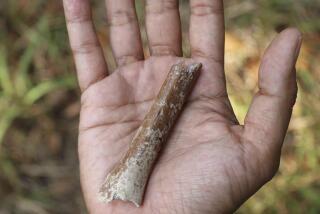Evidence of Human Dwarf Species Found
On an isolated islet of Indonesia, scientists have discovered skeletons of a previously unknown human species — tiny, hobbit-sized figures who lived among dwarf elephants and giant lizards as recently as 12,000 years ago when modern humans already thrived worldwide.
Startled experts in human origins called the discovery — made public today — of a contemporary human species barely 3 feet tall the most important — and surprising — human find in the past 50 years.
“It is probably the most significant thing that has happened in my professional lifetime,” said George Washington University paleoanthropologist Bernard Wood. “It comes out of nowhere.”
Found last year in a deep cave on the island of Flores east of Java, the creatures had the smallest brains and shortest bodies of any known human relative of the past 4 million years. Yet, on the time scale of human beginnings, the skeletal remains were so new that the bones had yet to fossilize.
In the past 13 months, a team of Australian and Indonesian researchers led by paleoanthropologist Peter Brown at the University of New England in New South Wales, Australia, has excavated seven partial skeletons of men and women belonging to the small human species from a cave called Liang Bua.
The discovery of Homo floresiensis, or Flores Man, as the extinct species has been named, is powerful evidence of human diversity and the inexorable force of evolution, researchers said. It brings to 11 the number of species sprouting on the human family tree over the past 2 million years.
More important, it demonstrates that selective pressures of adaptation to changing circumstances forced humankind into a new mold even after people had acquired the rudiments of culture and tool use, several experts said.
The evidence of stone tools found near the remains suggests that this diminutive offshoot of humankind commanded fire, cooked, chiseled primitive knives and axes, hunted in groups and demonstrated by implication other basic elements of human behavior despite their small brains, the researchers reported.
All told, it appears that marooned on this jungle island, humanity took a giant step backward to survive.
“It challenges the whole idea of what it is that makes us human,” Chris Stringer, director of human origins at the Natural History Museum in London, said today at a news conference.





